Code File
Header/Footer
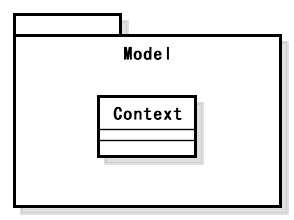
You can specify must-include/must-import file/package with this syntax template tags:
file.begin
file.end
/* header file */
#ifndef __Context_H__
#define __Context_H__
...
#endif//__Context_INTERNAL__
/* implementation file */
#define __Context_INTERNAL__
#include "CommonInclude.h"
#include "Context.h"
#pragma once
#include "Generic/CommonInclude.h"
using System;
using System.Collections.Generic;
using boolean = System.Boolean;
package model;
import java.io.*;
import java.util.*;
Dependencies’ References
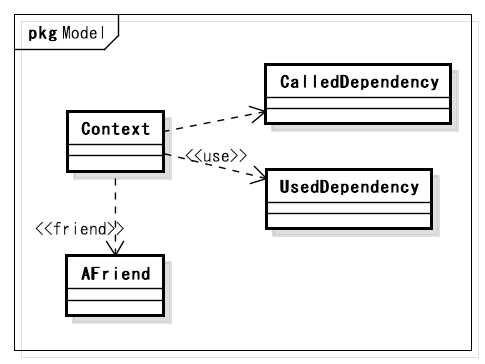
file.ext1st
file.extnxt
friend.name
friend.ext1st
friend.extnxt
friend.begin
friend.end
/* header file */
#include "UsedDependency.h" // Used (or strong) Dependency is included in header file, so that other module which includes this header won't need to care about this dependency
... // Public content
#endif//__Context_H__
#if !defined( Context_Init ) && ( defined( __Context_INTERNAL__ ) || defined( __AFriend_INTERNAL__ ) )
... // Protected content, and a friend declarated like above will be allowed to view protected content
#endif//__Context_INTERNAL__
/* source file */
#include "CalledDependency.h" // Called (or normal/weak) Dependency is included in source file
#include "Model/CalledDependency.hpp" // This C++ generator is inline type (almost source code is laid in header file) so that all dependencies are placed in header file
#include "Model/UsedDependency.hpp"
...
friend class Main;
using Model; // In this sample , CalledDependency and UsedDependency are belong to the same package so that a delcaration of package are enough
import model.*; // In this sample , CalledDependency and UsedDependency are belong to the same package so that a delcaration of package are enough
Super Class, Implemented Interface and Attribute Type References
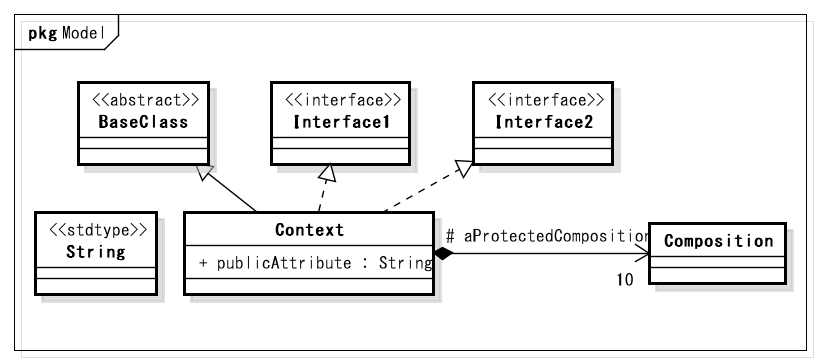
file.ext1st
file.extnxt
/* header file */
#include "BaseClass.h"
#include "Interface2.h"
#include "Interface1.h"
#include "Composition.h" // aProtectedComposition member has Composition type so that Composition header file will automatically included here.
// publicAttribute member has String type but marked by <<stdtype>> stereotype so that include declaration is omitted.
#include "Abstracts/BaseClass.hpp"
#include "Interfaces/Interface2.hpp"
#include "Interfaces/Interface1.hpp"
#include "Model/Composition.hpp"
using Abstracts;
using Interfaces;
using Model;
import abstracts.*;
import interfaces.*;
import model.*;
Class Stereotype
Standard Type
Object Type
Class Definition
Nested Items
Internal Structures
Internal Enumerations
Template, Generalization and Realization


| name | ext1st | extnxt | begin | end | |
|---|---|---|---|---|---|
| template | |||||
| inheritance | |||||
| class |
/** @class BaseClass
* @extends
*/
#define BaseClass_CLASS \
const BaseClassVtbl* const vTbl; \
typedef struct tagBaseClass{
BaseClass_CLASS
}BaseClass;
// There is no explicitly template and implemented interface realization in C language
/** @class Context
* @extends BaseClass
*/
#define Context_CLASS \
BaseClass_CLASS \
...
typedef struct tagContext{
Context_CLASS
}Context;
/** @class AFriend
* @extends
*/
#define AFriend_CLASS \
size_t cbSize; \
...
typedef struct tagAFriend{
AFriend_CLASS
}AFriend;
class BaseClass{
...
}
class Context: public BaseClass, public Interface2, public Interface1{
...
}
template<typename T0 , Composition* T1 , typename T2 = T0, Aggregration* T3 = Aggregration*>
class AFriend{
...
};
namespace Abstracts {
public abstract class BaseClass
{
...
}
}
namespace Model {
public class Context: BaseClass, Interface2, Interface1
{
...
}
}
namespace Model {
public class AFriend<T0, T1, T2, T3>
where T1: Composition
where T3: Aggregration
{
...
}
}
public abstract class BaseClass
{
...
}
public class Context extends BaseClass implements Interface2, Interface1
{
...
}
public class AFriend<T0, T1 extends Composition, T2, T3 extends Aggregration>
{
...
}
Attributes
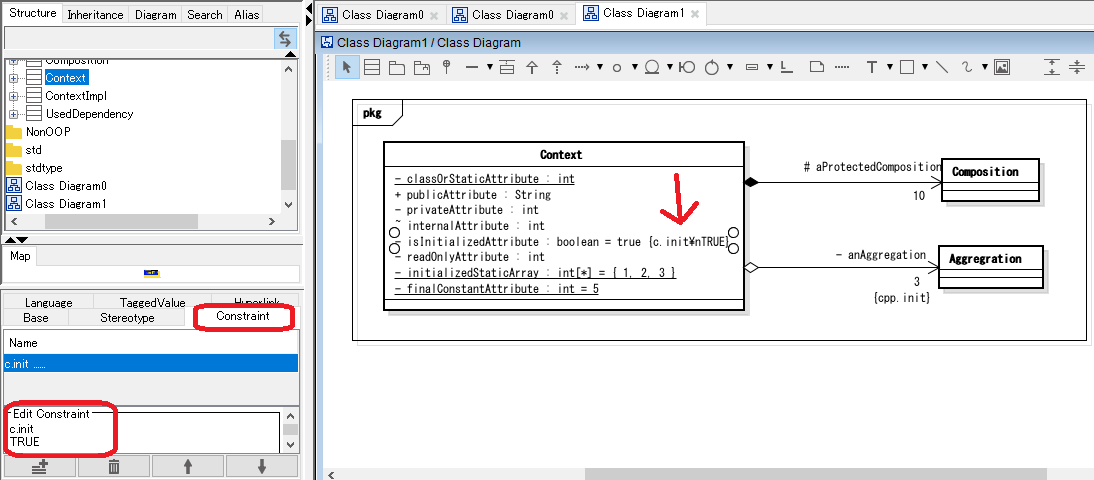
Attention: Attribute's Constraint field also can be used for initialization routine,
if this field is specified, the Initial Value in Base tab will be ignored.
This trick will be useful when you need language-specific or multi-line initialization code,
| name | ext1st | extnxt | begin | end | comments | |
|---|---|---|---|---|---|---|
| __s_attr | attribute of standard type | |||||
| __o_attr | attribute of object type | |||||
| __r_attr | attribute of referenced/pointer type | |||||
| _ms_attr | attribute with multiplicity of standard type | |||||
| _mo_attr | attribute with multiplicity of object type | |||||
| _mr_attr | attribute with multiplicity of referenced/pointer type | |||||
| c_s_attr | constant of standard type | |||||
| c_o_attr | constant of object type | |||||
| c_r_attr | constant of referenced/pointer type | |||||
| cms_attr | constant with multiplicity of standard type | |||||
| cmo_attr | constant with multiplicity of object type | |||||
| cmr_attr | constant with multiplicity of referenced/pointer type | |||||
| s_s_attr | static attribute or constant of standard type | |||||
| s_o_attr | static attribute or constant of object type | |||||
| s_r_attr | static attribute or constant of referenced/pointer type | |||||
| sms_attr | static attribute or constant with multiplicity of standard type | |||||
| smo_attr | static attribute or constant with multiplicity of object type | |||||
| smr_attr | static attribute or constant with multiplicity of referenced/pointer type |
/* header file *//* Attention: in C language, all attributes have only protected visibility */
#define Context_CLASS \
BaseClass_CLASS \
String publicAttribute; \
int privateAttribute; \
int internalAttribute; \
boolean isInitializedAttribute; \
const int readOnlyAttribute; \
Aggregration* anAggregation[ 3 ]; \
Composition aProtectedComposition[ 10 ]; \
typedef struct tagContext{
Context_CLASS
}Context;
/* source file */
/** @private @static @memberof Context */
static int classOrStaticAttribute;
/** @private @static @memberof Context */
static int initializedStaticArray[ ] = { 1, 2, 3 };
/** @private @static @memberof Context */
static const int finalConstantAttribute = 5;
/* header file */
class Context: public BaseClass, public Interface2, public Interface1{
private: static int classOrStaticAttribute;
private: static std::vector<int> initializedStaticArray;
private: static const int finalConstantAttribute = 5;
public: static void classOrStaticMethod(
public: String publicAttribute;
private: int privateAttribute;
public: int internalAttribute;
private: boolean isInitializedAttribute;
private: const int readOnlyAttribute;
private: std::vector<Aggregration*> anAggregation;
protected: std::vector<Composition*> aProtectedComposition;
}
/* source file */
int Context::classOrStaticAttribute;
std::vector<int> Context::initializedStaticArray = { 1, 2, 3 };
public class Context: BaseClass, Interface2, Interface1
{
private static int classOrStaticAttribute;
private static int[] initializedStaticArray = { 1, 2, 3 };
private const int finalConstantAttribute = 5;
public String publicAttribute;
private int privateAttribute;
internal int internalAttribute;
private boolean isInitializedAttribute;
private readonly int readOnlyAttribute;
private List<Aggregration> anAggregation;
protected List<Composition> aProtectedComposition;
}
public class Context extends BaseClass implements Interface2, Interface1
{
private static int classOrStaticAttribute;
private static int[] initializedStaticArray = { 1, 2, 3 };
private static final int finalConstantAttribute = 5;
public String publicAttribute;
private int privateAttribute;
int internalAttribute;
private boolean isInitializedAttribute;
private final int readOnlyAttribute;
private ArrayList<Aggregration> anAggregation;
protected ArrayList<Composition> aProtectedComposition;
}
Getter/Setter (Accessor/Mutator)
Default Getter/Setter
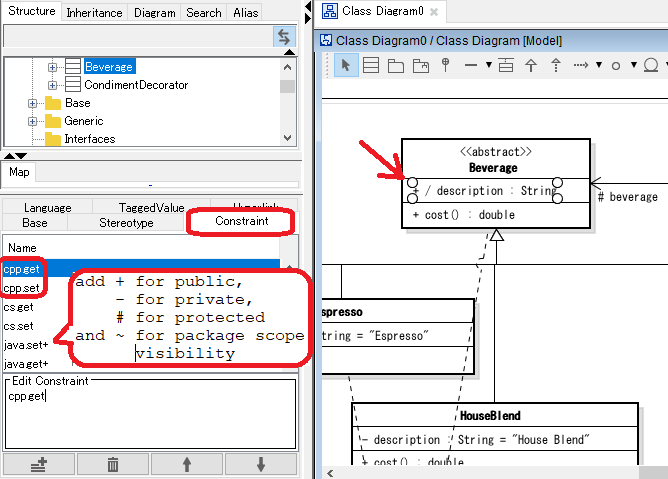
Attention: An Attribute with Constraint defined as "language.get" or "language.set" will have geter or setter correspondingly."
| name | ext1st | extnxt | begin | end | comments | |
|---|---|---|---|---|---|---|
| p_s_attr | getter/setter integrated attribute of standard type | |||||
| p_o_attr | getter/setter integrated attribute of object type | |||||
| p_r_attr | getter/setter integrated attribute of referenced/pointer type | |||||
| pms_attr | getter/setter integrated attribute with multiplicity of standard type | |||||
| pmo_attr | getter/setter integrated attribute with multiplicity of object type | |||||
| pmr_attr | getter/setter integrated attribute with multiplicity of referenced/pointer type |
/* Attention: Right now, generated C language does not support polymorphism Getter/Setter */
#define Beverage_CLASS \
const BeverageVtbl* const vTbl; \
size_t cbSize; \
String description; \
typedef struct tagBeverage{
Beverage_CLASS
}Beverage;
String Beverage_GetDescription( const Beverage* pBeverage ){
return pBeverage->description;
}
void Beverage_SetDescription( Beverage* pBeverage, String value ){
pBeverage->description = value;
}
/* Attention: Cpp supports polymophism, operator type Getter/Setter (C# style),
you can edit Syntax file to have function type (Java style) Getter/Setter if you want */
class Beverage{
protected: String description;
public: struct { Beverage* pContainer; friend Beverage;
operator String () const { return pContainer->getDescription(); }
String& operator = (const String& value) { pContainer->setDescription(value); }
} m_description;
protected: virtual String getDescription() const { return description; }
protected: virtual String& setDescription(const String& value) { return description = value; }
friend class Main;
public: Beverage(
String _description
): description( _description )
{
m_description.pContainer = this; /* Use Class's Constraint to add this code (see Auto-generated Constructor section below for more details) */
}
};
public abstract class Beverage
{
public virtual String description {
get;
set;
}
public Beverage(
String _description
){
description = _description;
}
}
public abstract class Beverage
{
public String getDescription(){
return description;
}
public void setDescription(String value){
description = value;
}
public Beverage(
String _description
){
description = _description;
}
public String description;
}
Customized Getter/Setter
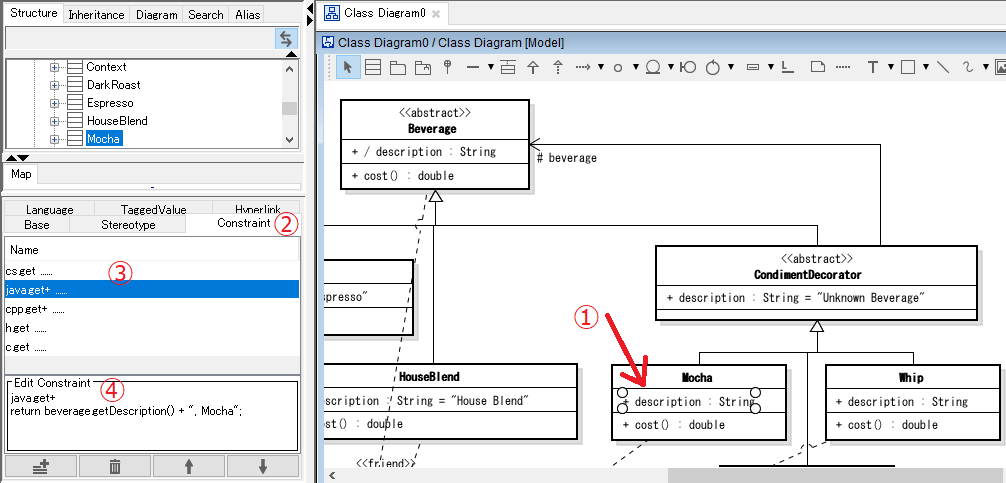
Attention: An Attribute with Constraint defined as "language.get" or "language.set" will have geter or setter correspondingly."
| name | ext1st | extnxt | begin | end | comments | |
|---|---|---|---|---|---|---|
| p_s_attr | leave | getter/setter integrated attribute of standard type | ||||
| p_o_attr | this | getter/setter integrated attribute of object type | ||||
| p_r_attr | column | getter/setter integrated attribute of referenced/pointer type | ||||
| pms_attr | blank | getter/setter integrated attribute with multiplicity of standard type | ||||
| pmo_attr | getter/setter integrated attribute with multiplicity of object type | |||||
| pmr_attr | getter/setter integrated attribute with multiplicity of referenced/pointer type |
/* Attention: you can see the "description" attribute is omitted here (because it was declared already in super class) */
/** @class Mocha
* @extends CondimentDecorator (which even more extended from Beverage class)
*/
#define Mocha_CLASS \
CondimentDecorator_CLASS \
typedef struct tagMocha{
Mocha_CLASS
}Mocha;
String Mocha_GetDescription( const Mocha* pMocha ){
return MakeString( "This sample does not use this as polymorphism property. Instead, it uses constructor code to do it." );
}
class Mocha: public CondimentDecorator{
protected: virtual String getDescription() const {
String sTemp = beverage->m_description;
return sTemp + ", Mocha";
};
};
public class Mocha: CondimentDecorator
{
public override String description {
get{ return beverage.description + ", Mocha"; }
}
}
public class Mocha extends CondimentDecorator
{
public String getDescription(){
return beverage.getDescription() + ", Mocha";
}
}
Auto-generated Constructor

- Attributes having Initial Value will be initialized by that value in constructor
- Attributes having Constraint defined (ex: c.init, cpp, init, java.init ...) will be initialized
to the next-line-value in constructor, and the Initial Value if have will be ignored.
- Attributes without any above initialization code will receive auto-generated input of
constructor as initialization value.
| name | ext1st | extnxt | begin | end | comments | |
|---|---|---|---|---|---|---|
| constructor | constructor related declaration | |||||
| ctor_call | super class7s constructor calling related declaration | |||||
| __s_attr | attribute of standard type | |||||
| __o_attr | attribute of object type | |||||
| __r_attr | attribute of referenced/pointer type | |||||
| _ms_attr | attribute with multiplicity of standard type | |||||
| _mo_attr | attribute with multiplicity of object type | |||||
| _mr_attr | attribute with multiplicity of referenced/pointer type | |||||
| c_s_attr | constant of standard type | |||||
| c_o_attr | constant of object type | |||||
| c_r_attr | constant of referenced/pointer type | |||||
| cms_attr | constant with multiplicity of standard type | |||||
| cmo_attr | constant with multiplicity of object type | |||||
| cmr_attr | constant with multiplicity of referenced/pointer type |
/** @memberof Context
* @brief Context auto-generated constructor
*/
#define Context_Init(_derivableAttribute, _publicAttribute, _privateAttribute, _internalAttribute, _readOnlyAttribute, _anAggregation, _aProtectedComposition)\
BaseClass_Init( P( _derivableAttribute ) )\
.vTbl = &gContextVtbl,\
.publicAttribute = _publicAttribute,\
.privateAttribute = _privateAttribute,\
.internalAttribute = _internalAttribute,\
.isInitializedAttribute = true,\
.readOnlyAttribute = _readOnlyAttribute,\
.anAggregation = P( _anAggregation ),\
.aProtectedComposition = P( _aProtectedComposition ),\
#define Context_Ctor( InitFunc, optionParams ) ( Context ){\
InitFunc\
\
}
/* Calling code: Context context = Context_Ctor( Context_Init( ... ), ... ); */
class Context: public BaseClass, public Interface2, public Interface1{
...
public: Context(
int _derivableAttribute,
String _publicAttribute,
int _privateAttribute,
int _internalAttribute,
int _readOnlyAttribute,
std::vector<Composition*> &_aProtectedComposition
): BaseClass( _derivableAttribute ),
publicAttribute( _publicAttribute ),
privateAttribute( _privateAttribute ),
internalAttribute( _internalAttribute ),
isInitializedAttribute( true ),
readOnlyAttribute( _readOnlyAttribute ),
anAggregation( ),
aProtectedComposition( _aProtectedComposition )
{
}
};
public class Context: BaseClass, Interface2, Interface1
{ ...
public Context(
int _derivableAttribute,
String _publicAttribute,
int _privateAttribute,
int _internalAttribute,
int _readOnlyAttribute,
List<Aggregration> _anAggregation,
List<Composition> _aProtectedComposition
): base( _derivableAttribute )
{
publicAttribute = _publicAttribute;
privateAttribute = _privateAttribute;
internalAttribute = _internalAttribute;
isInitializedAttribute = true;
readOnlyAttribute = _readOnlyAttribute;
anAggregation = _anAggregation;
aProtectedComposition = _aProtectedComposition;
}
}
public class Context extends BaseClass implements Interface2, Interface1
{ ...
public Context(
int _derivableAttribute,
String _publicAttribute,
int _privateAttribute,
int _internalAttribute,
int _readOnlyAttribute,
ArrayList<Aggregration> _anAggregation,
ArrayList<Composition> _aProtectedComposition
) {
super( _derivableAttribute );
publicAttribute = _publicAttribute;
privateAttribute = _privateAttribute;
internalAttribute = _internalAttribute;
isInitializedAttribute = true;
readOnlyAttribute = _readOnlyAttribute;
anAggregation = _anAggregation;
aProtectedComposition = _aProtectedComposition;
}
}
Super Class Constructor Call
Initialization Code
Operations
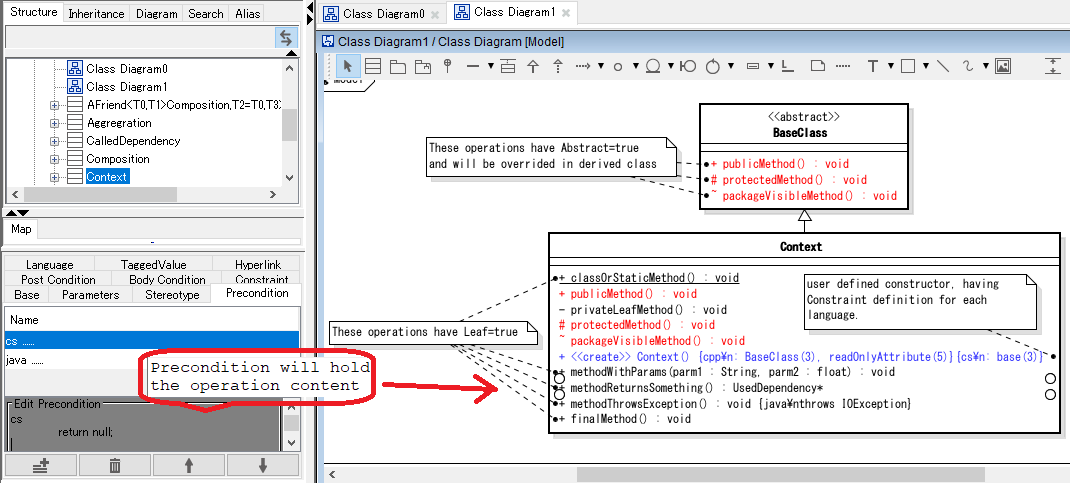
Attention: Attribute's Constraint field also can be used for initialization routine,
if this field is specified, the Initial Value in Base tab will be ignored.
This trick will be useful when you need language-specific or multi-line initialization code,
| name | ext1st | extnxt | begin | end | comments | |
|---|---|---|---|---|---|---|
| vptr_impl | virtual function table implementation (used for none OOP language like C) | |||||
| __c_oper | virtual operation with protected visibility | |||||
| __b_oper | virtual operation with public visibility | |||||
| vptr_decl | virtual function table declaration (used for none OOP language like C) | |||||
| _ac_oper | abstract operation with protected visibility | |||||
| _ab_oper | abstract operation with public visibility | |||||
| l_i_oper | leaf operation with private visibility | |||||
| l_c_oper | leaf operation with protected visibility | |||||
| l_b_oper | leaf operation with public visibility | |||||
| lai_oper | leaf abstract operation with private visibility (used for C language as leaf function prototype) | |||||
| vptr_call | used in abstract operations (used for none OOP language like C) | |||||
| s_i_oper | static operation with private visibility | |||||
| s_c_oper | static operation with protected visibility | |||||
| s_b_oper | static operation with public visibility | |||||
| sai_oper | static abstract operation with protected visibility(used for C language as leaf function prototype) | |||||
| sab_oper | static abstract operation with public visibility (used for C language as leaf function prototype) |
The belows are in proposal (intented to use for Pascal and Basic language families)
| __f_oper | virtual function | |||||
| _af_oper | abstract function | |||||
| l_f_oper | leaf function | |||||
| s_f_oper | static function |
/* -------------------------------- Abstract class's header file -------------------------------- */
#ifndef __BaseClass_H__
#define __BaseClass_H__ // public area
typedef struct tagBaseClass BaseClass;
void BaseClass_publicMethod( BaseClass* pBaseClass );
void BaseClass_packageVisibleMethod( BaseClass* pBaseClass );
#endif//__BaseClass_H__
#if !defined( BaseClass_Init ) && ( defined( __BaseClass_INTERNAL__ ) ) // protected area
void BaseClass_protectedMethod( BaseClass* pBaseClass );
...
typedef struct tagBaseClassVtbl{ // virtual function table
void ( * const ppublicMethod )( BaseClass* );
void ( * const pprotectedMethod )( BaseClass* );
void ( * const ppackageVisibleMethod )( BaseClass* );
}BaseClassVtbl;
/** @class BaseClass
* @extends
*/
#define BaseClass_CLASS \
const BaseClassVtbl* const vTbl; \
typedef struct tagBaseClass{
BaseClass_CLASS
}BaseClass;
#endif//__BaseClass_INTERNAL__
/* --------------------------- Abstract class's source file is ommited--------------------------- */
/* --------------------------- Concrete class's source file is ommited--------------------------- */
/* -------------------------------- Concrete class's source file -------------------------------- */
void Context_classOrStaticMethod( void ){
} /* Context_classOrStaticMethod */
/** @public @memberof Context */
static void Context_publicMethod( Context* pContext ){
} /* Context_publicMethod */
/** @private @memberof Context */
static void Context_privateLeafMethod( Context* pContext ){
} /* Context_privateLeafMethod */
/** @public @memberof Context */
Context_Context( Context* pContext ){
} /* Context_Context */
/** @public @memberof Context */
void Context_methodWithParams( Context* pContext, String parm1, float parm2 ){
} /* Context_methodWithParams */
/** @public @memberof Context */
UsedDependency* Context_methodReturnsSomething( Context* pContext ){
return NULL;
} /* Context_methodReturnsSomething */
/** @public @memberof Context */
void Context_methodThrowsException( Context* pContext ){
} /* Context_methodThrowsException */
/** @public @memberof Context */
void Context_finalMethod( Context* pContext ){
} /* Context_finalMethod */
/** @protected @memberof Context */
static void Context_protectedMethod( Context* pContext ){
} /* Context_protectedMethod */
/** @protected @memberof Context */
static void Context_packageVisibleMethod( Context* pContext ){
} /* Context_packageVisibleMethod */
/* -------------------------------- Abstract class -------------------------------- */
class BaseClass{
public: virtual void publicMethod() = 0;
protected: virtual void protectedMethod() = 0;
protected: virtual void packageVisibleMethod() = 0;
};
/* -------------------------------- Concrete class -------------------------------- */
class Context: public BaseClass, public Interface2, public Interface1{
public: static void classOrStaticMethod(
){
} /* Context.classOrStaticMethod */
public: virtual void publicMethod(
){
} /* Context.publicMethod */
private: void privateLeafMethod(
){
} /* Context.privateLeafMethod */
public: Context(
): BaseClass(3), readOnlyAttribute(5){
std::cout << "Manual Constructor" << std::endl;
} /* Context.Context */
public: void methodWithParams(
String parm1,
float parm2
){
} /* Context.methodWithParams */
public: UsedDependency methodReturnsSomething(
){
} /* Context.methodReturnsSomething */
public: void methodThrowsException(
){
} /* Context.methodThrowsException */
public: void finalMethod(
){
} /* Context.finalMethod */
protected: virtual int& setDerivableAttribute(const int& value) {
return privateAttribute = value;
};
friend class Main;
protected: virtual void protectedMethod(
){
} /* Context.protectedMethod */
protected: virtual void packageVisibleMethod(
){
} /* Context.packageVisibleMethod */
...
};
/* -------------------------------- Abstract class -------------------------------- */
public abstract class BaseClass
{
public abstract void publicMethod(
);
protected abstract void protectedMethod(
);
protected abstract void packageVisibleMethod(
);
}
/* -------------------------------- Concrete class -------------------------------- */
public class Context: BaseClass, Interface2, Interface1
{
public static void classOrStaticMethod(
){
} /* Context.classOrStaticMethod */
public override void publicMethod(
){
} /* Context.publicMethod */
private void privateLeafMethod(
){
} /* Context.privateLeafMethod */
public Context(
): base(3){
} /* Context.Context */
public void methodWithParams(
String parm1,
out float parm2
){
parm2 = 3f;
} /* Context.methodWithParams */
public UsedDependency methodReturnsSomething(
){
return null;
} /* Context.methodReturnsSomething */
public void methodThrowsException(
){
} /* Context.methodThrowsException */
public void finalMethod(
){
} /* Context.finalMethod */
public override int derivableAttribute {
set{ privateAttribute = value; }
}
protected override void protectedMethod(
){
} /* Context.protectedMethod */
protected override void packageVisibleMethod(
){
} /* Context.packageVisibleMethod */
...
}
/* -------------------------------- Abstract class -------------------------------- */
public abstract class BaseClass
{
public abstract void publicMethod(
);
protected abstract void protectedMethod(
);
protected abstract void packageVisibleMethod(
);
}
/* -------------------------------- Concrete class -------------------------------- */
public class Context extends BaseClass implements Interface2, Interface1
{
public static void classOrStaticMethod(
){
} /* Context.classOrStaticMethod */
public void publicMethod(
){
} /* Context.publicMethod */
private void privateLeafMethod(
){
} /* Context.privateLeafMethod */
public Context(
){
super(3);
readOnlyAttribute = 7;
} /* Context.Context */
public void methodWithParams(
String parm1,
float parm2
){
} /* Context.methodWithParams */
public UsedDependency methodReturnsSomething(
){
return null;
} /* Context.methodReturnsSomething */
public void methodThrowsException(
)throws IOException{
} /* Context.methodThrowsException */
public void finalMethod(
){
} /* Context.finalMethod */
void setDerivableAttribute(int value){
privateAttribute = value;
}
protected void protectedMethod(
){
} /* Context.protectedMethod */
protected void packageVisibleMethod(
){
} /* Context.packageVisibleMethod */
...
}